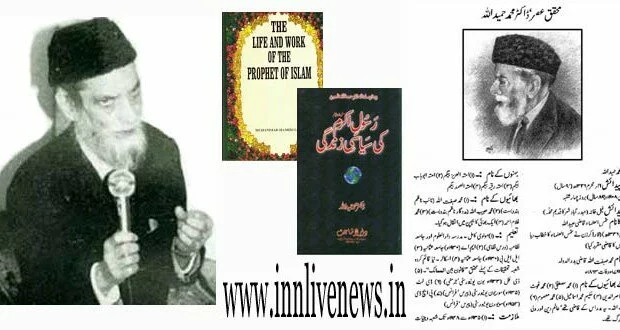(February 9, 1908 – December 17, 2002)
Dr Muhammad Hamidullah was a Muhaddith, Faqih and a scholar of Islamic law. He was an academic author with over 450 books cited in WorldCat.org, the world’s largest bibliographic database.
Dr Hamidullah was born, brought up and educated in Hyderabad. He hailed from a family of scholars. The youngest amongst three brothers and five sisters, his ancestral roots belong to the Nawayath community and his ancestors belonging to the famed Meccan tribe, the Bani’ Hashim, some of whom migrated to India, settling first in Madras few centuries ago and were eminent scholars in their own right.
He earned his BA, LLB and MA at Osmania University. He travelled to Germany and was awarded DPhil by Bonn University in 1932. After serving in the faculty of Bonn as a lecturer in Arabic and Urdu for a short time, he went to France and registered at Sorbonne University for his second doctorate. He was awarded D.Litt by the university after 11 months. He taught international law at Osmania University between 1936 and 1946.
In 1946, Hamidullah was appointed by the Nizam as part of the delegation sent to London and the United Nations in New York to seek support against the possible invasion of the Hyderabad State by Indian Union. Subsequently, he moved to Pakistan and was involved in writing of Pakistan’s constitution, but did not to settle there as he found the cultural environment not to his liking. Nevertheless in 1985, he was awarded the Hilal-e-Imtiaz, the highest civilian award of Pakistan. The award included a substantial money amount but this was donated by him to the Islamic Research Academy, Islamabad.
In 1948 he returned to France, living there for the rest of his life, apart from travel to teaching posts he held in Turkey for a number of years. He also held a post with French National Centre for Scientific Research from 1954, which ended in 1978.
Hamidullah was the last remaining citizen of the erstwhile Hyderabad State and never obtained the citizenship of any other nation. Classed as a Refugee of Hyderabad by the French Government, which allowed him to stay in Paris, he remained exiled from his homeland after its annexation by the Indian Government in 1948.
He devoted his whole life to scholarship and did not marry. His ancestors and extended family are jurists, writers and administrators. His great grandfather Maulvi Mohammed Ghauth Sharfu’l-Mulk (d. 1822 CE) was scholar of Islamic sciences, writing over 30 books in Arabic, Persian and Urdu, including a seven volume exegesis of the Holy Quran. His maternal grandfather Qadi Mohammed Sibghatullah was a jurist and an scholar of repute writing an exegesis of the Holy Quran as well as other books. He was also appointed Chief Judge of Madras in 1855 CE.
Hamidullah’s father Mufti Abu Mohammed Khalilullah, was also scholar of Islamic jurisprudence, a director of revenue in the government of Nizam of Hyderabad, and the pioneer in establishing an interest-free banking system in Hyderabad.
Hamidullah is known for contributions to the research of Hadith history, translations of the Quran into multiple languages and in particular into French language (first by a Muslim scholar) and for the monumental biography of the Prophet Muhammad (PBUH) in French. He is also famous for discovering a missing work on Prophet Muhammad regarded as one of his great contributions to the Hadith literature. The earliest Hadith manuscript still extant today, Sahifa Hammam bin Munabbah, was discovered in a Damascus library. Hammam bin Munabbah being a disciple of Abu Huraira one of the Sahaba. It proved, that the earliest manuscripts had been absorbed into the much bigger later compilations.
A prolific writer, his extensive works on Islamic science, history and culture have been published in several languages and many thousands of articles in learned journals. His scholarship is regarded by many as unparalleled in the last century. A polymath, he was fluent in 22 languages including Urdu (his mother tongue), Persian, Arabic, French, English, German, Turkish etc. He learned Thai at the age of 84.
Books Authored by Dr Hameedullah:
The Muslim Conduct of State (1941)
Introduction to Islam (1957)
Battlefields of the Prophet Muhammad (1992)
Die Rezeption Europaischen Rechts in Haiderabad (1953)
Emergence of Islam (1993)
Islam in a Nutshell (1996)
Le Coran – Et la traduction française du sens de ses versets (2001)
Le Saint Coran: Traduction Et Commentaire de Muhammad Hamidullah Avec La Collaboration de M. Leturmy (from 1959 onwards)
Embassy of Queen Bertha of Rome to Caliph al-Muktafi Billah in Baghdad (1953)
The First Written Constitution in the World (1975 and 1986)
Introduction to Islam (1969)
Islamic notion of conflict of laws (1945)
Islam: a General Picture (1980)
Islam, Philosophy and Science: Four Public Lectures Organized By Unesco June 1980 (editor) (1981)
Kuran-ı Kerim tarihi: Bir deneme (Ilmi eserler) (1991)
Le “Livre Des Genenalogies” [D’al-Baladuriy by al-Baladuri] (1954)
The life and work of the Prophet of Islam (1998)
Muhammad Ibn Ishaq, the biographer of the Holy Prophet (Pakistan Historical Society. Publication) (1967)
Muhammad Rasulullah: A concise survey of the life and work of the founder of Islam (1979)
Muslim conduct of state: Being a treatise on Siyar (Siyar), general introduction (1953)
The prophet of Islam: Prophet of migration (1989)
The Prophet’s establishing a state and his succession (1988)
Why Fast? Spiritual & Temporal Study of Fast in Islam (Centre Culturel Islamique Paris Series) (1982)
 INN Live Urdu News Channel – India Breaking News, Headlines, Hyderabad اردو خبریں
INN Live Urdu News Channel – India Breaking News, Headlines, Hyderabad اردو خبریں

